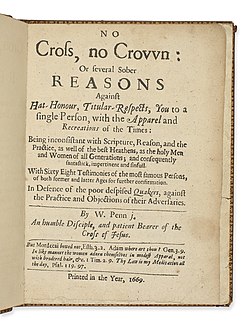Summary
Penn exhorts the spirit of Primitive Christianity. [1] The book is divided into two parts, the first dealing with the importance of self-denial in the Christian life and the second gathering a series of references to men through the ages who have written of the importance of self-denial, including "heathens," professed Christians, and "retired, aged, and dying men, being their last and serious reflections, to which no ostentation or worldly interests could induce them."
Penn's view of Christianity is intensely spiritual rather than formal, and in passing he defends several practices typical of the Religious Society of Friends (Quakers) including clothing which was not fashionable and speech which addressed royal and commoner alike in the second person singular "thee" and "thou."
This page is based on this
Wikipedia article Text is available under the
CC BY-SA 4.0 license; additional terms may apply.
Images, videos and audio are available under their respective licenses.
